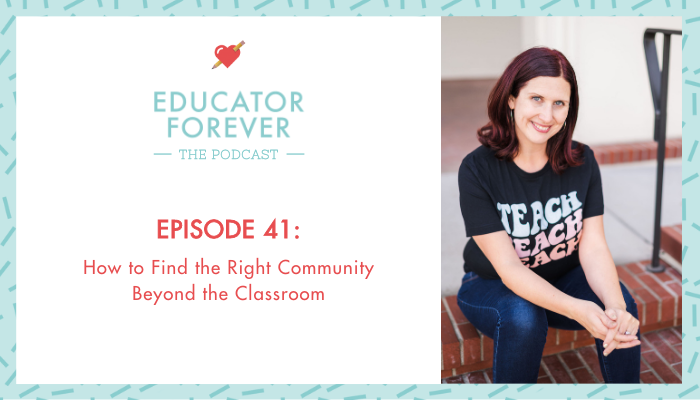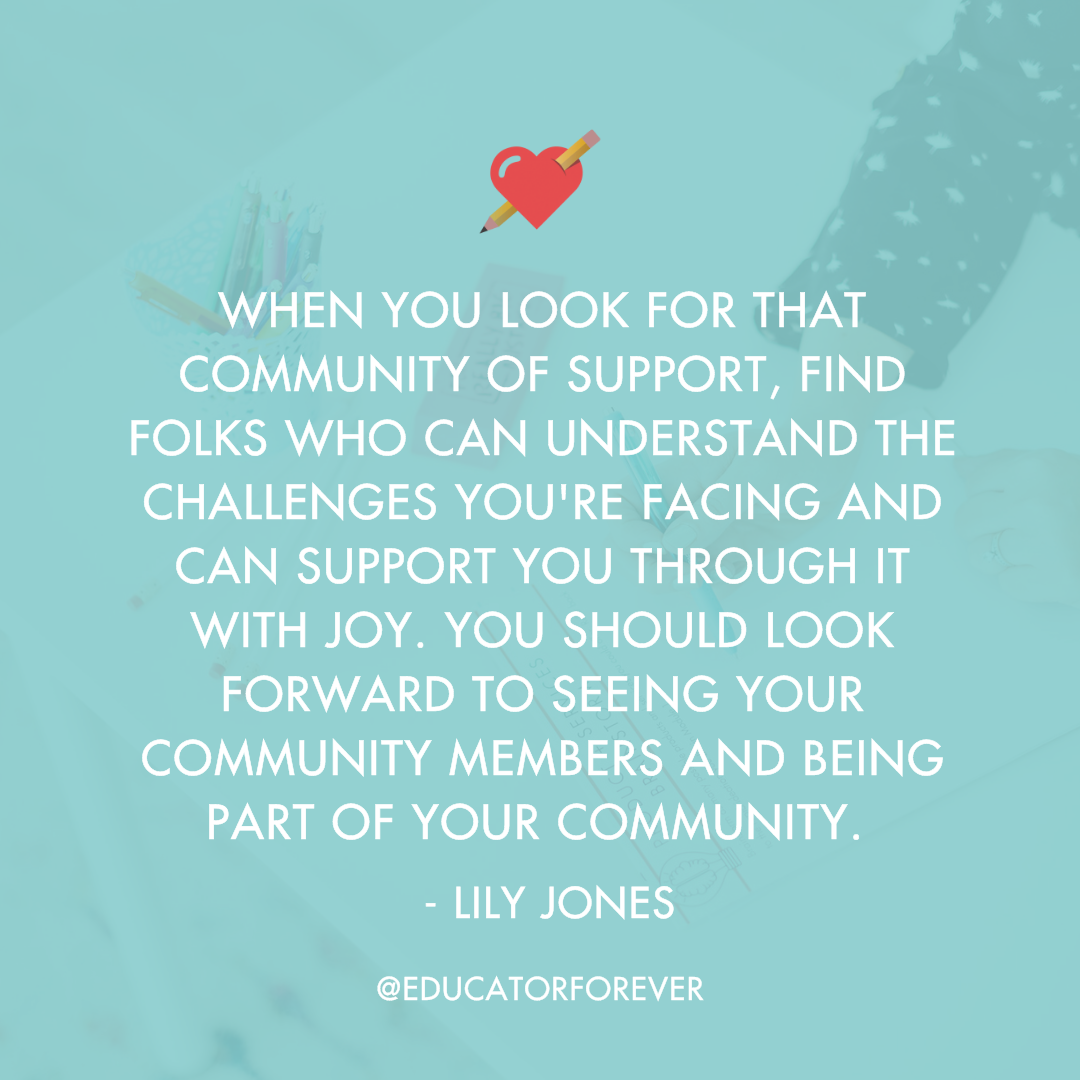Episode 41: How to Find the Right Community Beyond the Classroom
Although there are a lot of deep systemic issues within the education system, one thing it does have is a sense of teacher community. You’re surrounded by individuals who all have the same career, passion for helping kids, and lifelong learners. However, when stepping away from the classroom to pursue other endeavors, finding a community that you belong to becomes increasingly more difficult.
In order to help you find your teacher community, I’m sharing four things to look for in your next community. Each of these items ensure that you feel heard, successful, and continue growing in your skills. But if you’re looking for a new teacher community, I encourage you to join The Educator Forever Network where we support individuals starting a new career or chapter in their life. Come join our community or learn how to find one today!
Topics Discussed:
Ways to stay accountable with your community
Examples of skill building activities you can do
Why a community should encourage and support you in your journey
How The Educator Forever Network can be a community you belong to
Resources mentioned:
Take our FREE quiz to nail down your next best career step in education.
If you’re enjoying this podcast, please leave a rating and review onApple Podcasts.
Related episodes and blog posts:
Read the transcript for this episode:
When I first left the classroom, I felt really alone. Most of my friends were teachers, they were going back to the classroom, I was at home trying to hustle and make it work to make up my teaching income, if not more, with a baby at home, and I was embarking on this new chapter of my life, and really letting go of what I thought the future of my career would be.
And so as I did that, it was hard to relate to some of my teacher friends who were still in the classroom, not doing work on the side, not really exploring this other world out there. So through Educator Forever, I've really built a teacher community of people doing similar work.
And honestly, that's the community that I wish I had, when I first started out beyond the classroom. I wish that I had people who had worked similar jobs, who had tried things out, who were dealing with the same struggles and successes that I was.
And so it's been such a joy to create this community of teachers really expanding their impact beyond the classroom, because not only do they support each other, but it also is so invigorating and refreshing to me, and I have to say, I'm a little jealous, I didn't have this community when I was starting off.
But when you're thinking about building your life beyond the classroom and starting to go off in that next step of your career, I want you to think about how important finding the right community is. And as you look for our community, I want you to think about these four things that I'm going to go over.
Because as a classroom teacher, you have likely a strong community of other teachers, you know, you get together in the lunchroom, you have the same break, so you're there for each other. And when you move to working, especially virtually it can be hard to build community.
There aren't those like water cooler moments, when do we even have water coolers at schools. But really thinking about like, there are those moments where you passing each other in the hallway or find time to chat. So we can create those communities for ourselves.
The community that you find beyond the classroom doesn't have to be virtual, it could be in person as well. But I want you to think about these four things to look for.
The first one is empowerment. I want you to find a community that makes you feel empowered, that makes you feel excited about your next step. And that you feel a sense of belonging in that community. Along with that there's usually a sense of vulnerability, and maybe uncertainty too, because you're all trying new things.
But when you are in an empowering community, there's always a positive mindset, you know, doesn't mean that hard things don't happen. But we're there to support each other. And really to know that we can do hard things we can get through challenging times.
Along with empowerment comes a commitment to advocacy. So think about does the community you're joining acknowledge the reason why there are so many transitioning teachers is because of deep systemic issues within the education system. Like truly, there are so many things that we need to change and fix within education within schools.
It's not you who's the problem. It's the whole entire system. So I encourage you to find a community that acknowledges this doesn't put the blame on teachers, and really empowers teachers to be the education experts that we are, and to go out and change some of those frustrating things.
So after thinking about does my community focus on teacher empowerment, I want you to think about accountability. Because yes, communities make us feel good, they make us feel a sense of belonging, they make us feel excited about tackling our next chapter, but they also at their best to hold us accountable.
And this is so key when you're starting something for yourself, it can be really easy to feel lost, it can be really easy to not take that action forward.
So really a great online teaching community will provide you with lots of different ways to stay accountable. Some of these ways could be accountability buddies, like you find a buddy and you hold each other accountable. And this could even be the start of the community that you join, right.
It could just be you and another teacher interested in doing similar work holding each other accountable. You could meet on Zoom, you could text each other, you could email each other like whatever it is that holds you accountable for meeting your goals.
Then you could do virtual Hangouts, you know, accountability within a community can look like getting together all in the Zoom Room with 20-30 40-50, whatever people, and really holding each other accountable through showing up. And through being part of that community.
And continued support, you know, sometimes accountability looks like more one on one support, or it looks like a regular group that meets in a small group. But thinking about really how you're going to get the support, you need to move into your next chapter of your education career.
So we've talked about empowerment and accountability. Now, I want you to think about skill development, because any career shift involves building skills and learning new things.
And even though you are an education expert, and can do so many things beyond the classroom, that doesn't mean we don't have to learn anything else. And really finding non teaching jobs in education requires you to shift your skills a little bit, and to learn new skills.
Teachers are lifelong learners, and we are usually ready for this. But really thinking about a community that will support you and give you that skill development, too. So think about does this community help you explore your options, knowing there's not one size fits all?
I would say that's something to be wary of when looking for an online community. If it's like you must follow these five steps. No, nobody must follow any five steps, we have to think about what is personalized to us, what resonates to us, what gets us as individuals closer to our particular goals?
Then think about does the community support you to develop your skills? Like our curriculum development foundations program is all focused on helping teachers develop the curriculum skills that they need to work in curriculum design, knowing that we don't expect people to know this. It's a whole different genre of writing. And we're here to teach you those skills.
Other skill building activities could be focused on growing your business, networking, using LinkedIn, writing your resume, like the list goes on and on. But I think for our community to be really successful, it can't just be empowerment and accountability, there also has to be a part of it that's skill development.
And then last but not least, I encourage you to find a community that's focused on joy. And understanding that we want this to be about building relationships with people just like in the classroom, you know, we know that kids learn better when they have strong supportive relationships. Same thing for grownups.
So really, when you look for that community of support, find folks who can understand the challenges you're facing, and really can support you through it with joy, you know, you should look forward to seeing your community members to being part of your community.
So to recap, those four things to look for when building a community beyond the classroom are empowerment, accountability, skill development, and joy and understanding. And we here at Educator Forever have created a community based on all four of these things.
It's called the Educator Forever Network and through it, we have weekly calls, we have accountability, we have an amazing community, through some of those calls are built on supporting teachers. Some of those calls are built on skill development. And honestly, they're all kind of built on both.
But really creating that community that propels people forward. And we'd love to have you try it out. You can go to learn.educatorforever.com/network And I'll put it in the show notes as well. And you can try it out.
It's a monthly membership where you get to come to our community calls you get our signature beyond the classroom program, you get extended weekly job leads a Slack site with tons of job leads and connection with community members there.
And above all, you get to be part of an amazing supportive community, who understands what you're going through as you transition outside of the classroom. We'd love to see you there.


